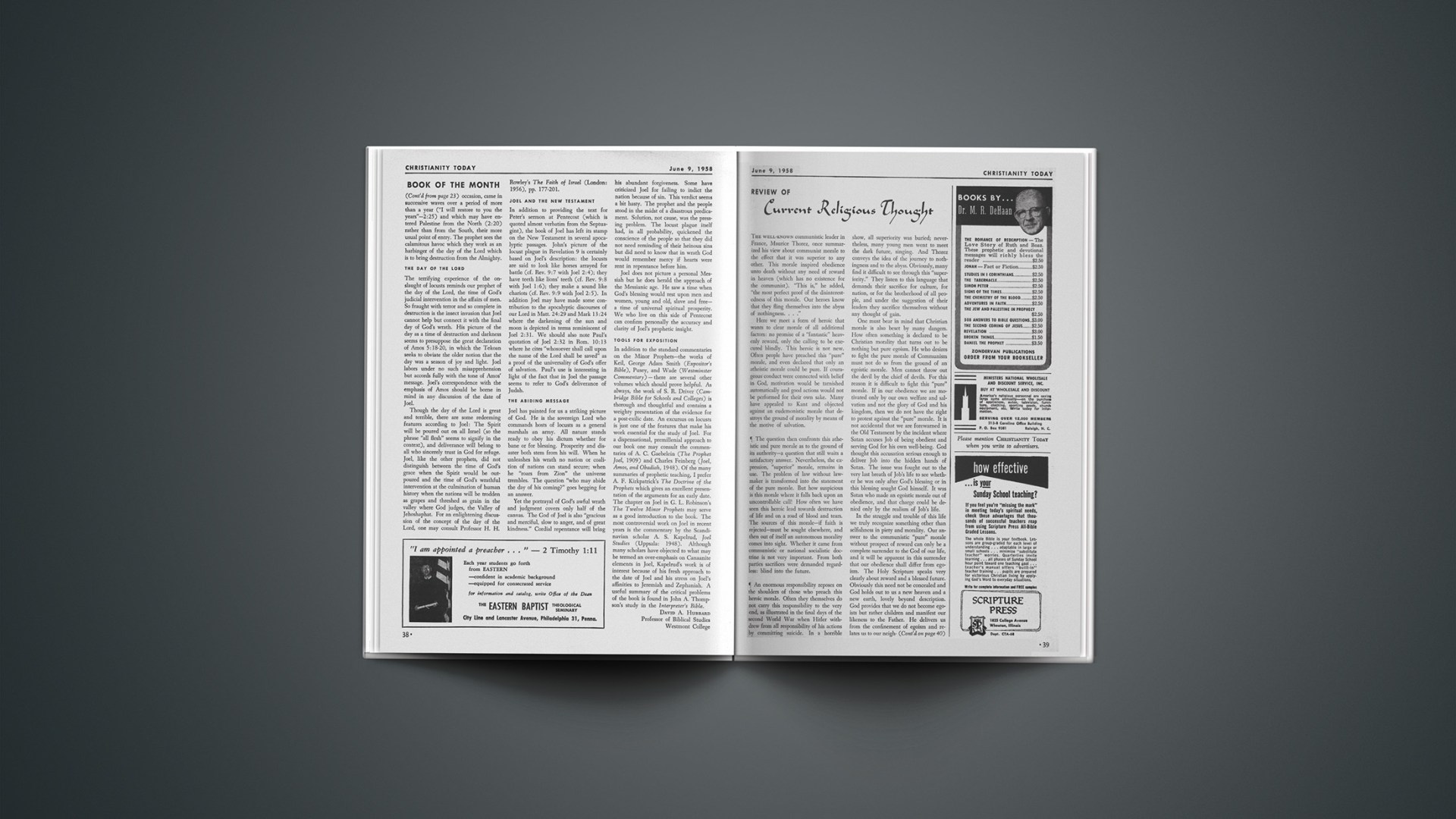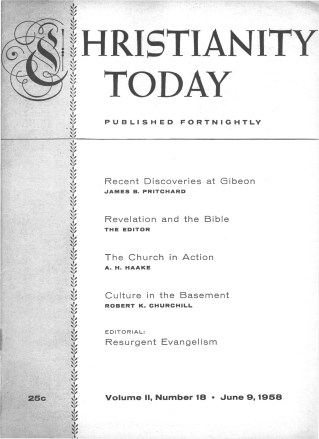The well-known communistic leader in France, Maurice Thorez, once summarized his view about communist morale to the effect that it was superior to any other. This morale inspired obedience unto death without any need of reward in heaven (which has no existence for the communist). “This is,” he added, “the most perfect proof of the disinterestedness of this morale. Our heroes know that they fling themselves into the abyss of nothingness.…”
Here we meet a form of heroic that wants to clear morale of all additional factors: no promise of a “fantastic” heavenly reward, only the calling to be executed blindly. This heroic is not new. Often people have preached this “pure” morale, and even declared that only an atheistic morale could be pure. If courageous conduct were connected with belief in God, motivation would be tarnished automatically and good actions would not be performed for their own sake. Many have appealed to Kant and objected against an eudemonistic morale that destroys the ground of morality by means of the motive of salvation.
The question then confronts this atheistic and pure morale as to the ground of its authority—a question that still waits a satisfactory answer. Nevertheless, the expression, “superior” morale, remains in use. The problem of law without lawmaker is transformed into the statement of the pure morale. But how suspicious is this morale where it falls back upon an uncontrollable call! How often we have seen this heroic lead towards destruction of life and on a road of blood and tears. The sources of this morale—if faith is rejected—must be sought elsewhere, and then out of itself an autonomous morality comes into sight. Whether it came from communistic or national socialistic doctrine is not very important. From both parties sacrifices were demanded regardless: blind into the future.
An enormous responsibility reposes on the shoulders of those who preach this heroic morale. Often they themselves do not carry this responsibility to the very end, as illustrated in the final days of the second World War when Hitler withdrew from all responsibility of his actions by committing suicide. In a horrible show, all superiority was buried; nevertheless, many young men went to meet the dark future, singing. And Thorez conveys the idea of the journey to nothingness and to the abyss. Obviously, many find it difficult to see through this “superiority.” They listen to this language that demands their sacrifice for culture, for nation, or for the brotherhood of all people, and under the suggestion of their leaders they sacrifice themselves without any thought of gain.
One must bear in mind that Christian morale is also beset by many dangers. How often something is declared to be Christian morality that turns out to be nothing but pure egoism. He who desires to fight the pure morale of Communism must not do so from the ground of an egoistic morale. Men cannot throw out the devil by the chief of devils. For this reason it is difficult to fight this “pure” morale. If in our obedience we are motivated only by our own welfare and salvation and not the glory of God and his kingdom, then we do not have the right to protest against the “pure” morale. It is not accidental that we are forewarned in the Old Testament by the incident where Satan accuses Job of being obedient and serving God for his own well-being. God thought this accusation serious enough to deliver Job into the hidden hands of Satan. The issue was fought out to the very last breath of Job’s life to see whether he was only after God’s blessing or in this blessing sought God himself. It was Satan who made an egoistic morale out of obedience, and that charge could be denied only by the realism of Job’s life.
In the struggle and trouble of this life we truly recognize something other than selfishness in piety and morality. Our answer to the communistic “pure” morale without prospect of reward can only be a complete surrender to the God of our life, and it will be apparent in this surrender that our obedience shall differ from egoism. The Holy Scripture speaks very clearly about reward and a blessed future. Obviously this need not be concealed and God holds out to us a new heaven and a new earth, lovely beyond description. God provides that we do not become egoists but rather children and manifest our likeness to the Father. He delivers us from the confinement of egoism and relates us to our neighbor that we may learn that he who loves his neighbor fulfills the law. And when nations are assembled before God’s throne (Matt. 25) judgments will be rendered on the basis of one cup of cold water. The Bible is far more charitable than the communistic morale, but just because of this the Word of God is more in earnest. It talks about grace and judgment, about reward and punishment; nevertheless, along this road to the future, life is renewed completely in service to God and neighbor. The commandment of God transcends the contradiction between egoism and disinterested piety and indicates a road on which all life is blessed.
He who fully rejects the communistic pure morale must pay special attention to the principle of “the cup of cold water” and to the commandment, “love your neighbor.” He who cuts the second commandment from the first, or the first from the second, has no real resistance against this heroic morale. He ends up with an inferior morality that is detrimental to the neighbor. It is no accident that one of the longest parables in the New Testament concerns the charitable Samaritan. Not the prospect of reward (the great reward) beclouds the morale but rather the misunderstanding of the command of God that he who seeks life for himself also seeks life for others. Egoism is now once and for all the perfect counterpart of man as the image of God—the man, who resembles the Father, is moved by what Paul terms “love of mankind” (Titus 3:4).
It would truly be sad, if in reaction to the Roman Catholic doctrine of the merit of good works, we would pay scant attention to the teachings of Holy Scripture concerning reward. The Scripture clearly mentions reward and even judgments concerning works. But we must understand reward correctly. We are not allowed to become Christian egoists, and the judgment of God is upon all who forget the second commandment is “like unto the first.”
Herein is the touchstone of the Christian community, its true Christian life on the earth: the imitation of God. Herein only does her light shine before men (Matt. 5:16). Christ does not hesitate to speak about her light. But all misunderstanding is excluded as he warns that community with his unforgettable word: “Let your light so shine before men [there is no hidden Christianity] that they may see your good works, and glorify your Father which is in heaven.”



